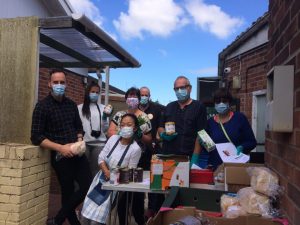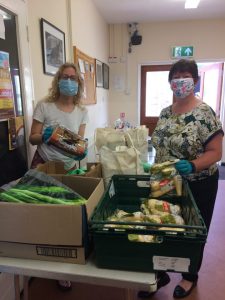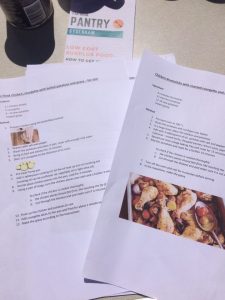
Food really is a wonderful thing, it can bring joy and comfort and for many people spending an afternoon cooking can put the world to rights, not to mention delight those who benefit from your labours. Cllr Hilary Bruce, Bridgwater Fairfax said, “Everyone should have access to good, healthy food, which should also be affordable. In the UK, that should be a given, but sadly that is not the case. The British Medical Journal published an article in January 2019 (BMJ 2019;364:l126) reporting that food insecurity in the UK is amongst the worst in Europe, especially for children.”
Food insecurity is defined as “having limited access to food…due to money or other resources”.
The Environmental Audit Committee published a report in January 2019 Hunger, Malnutrition and Food Insecurity in the UK, which is both interesting and disturbing. Take the time to read it in full if you can, but to give you an idea, here are just a few extracts from it:
-In June 2017, UNICEF found that that in the UK approximately 19% of children under age 15 live with an adult who is moderately or severely food insecure, of whom half are severely food insecure.
-Almost half of young mothers (aged 16–24) surveyed by Young Women’s Trust admitted regularly missing meals to provide for their children.
-End Hunger UK describes how food insecurity can contribute to both obesity and under-nutrition, and how all three can coexist. Insufficient access to food can result in compromised health for a number of reasons. It can lead to the adoption of risk- averse food purchasing habits, where, in the face of having little to spend, households prioritise purchasing foods that will not go to waste and that are most filling. Often this means a reliance on cheap foods that are nutrient-poor but calorie-rich.
-Three themes emerged in the evidence we collected relating to the causes of hunger, food insecurity and malnutrition:
- Low incomes and rising living costs;
- Universal Credit and the benefits system;
- Cuts to funding for local social care services.
There has been a severe lack of data from the government about food insecurity in the UK, but after years of campaigning, it was announced that the Department for Work and Pensions will publish an index of food insecurity in the UK as part of an established UK-wide annual survey in March 2021.
Councillors Supporting the Project

Cllr Hilary Bruce said, “The Covid-19 pandemic has intensified the difficulties faced by those who are already food insecure and pushed new groups into food insecurity. Thankfully, there has been an amazing response from the community, local councils and the food bank to support those in need, with volunteers shopping for people, providing meals and checking in with people to ensure nobody goes hungry. Despite this, still we find that some people slip through the gaps for various reasons, often too proud or embarrassed to ask for help or admit to needing help, so we must build on the work that has been done and become more innovative to find ways of reaching out to everyone. Food sharing schemes are a fantastic way of doing that because food sharing, or food saving as I prefer to call it, is not just for those in need, it appeals to a broad range of people thanks to the environmental benefits of reducing food waste. Participation in food sharing schemes also produces positive relationships, connecting people with other members of their community”.
Sedgemoor District Council’s Communities Team has been working with partners to trial an innovative new food project in Bridgwater. The ‘Sydenham Local Pantry Project’, which launches on Thursday 16 th July, aims to provide low cost, surplus food for local residents of Sydenham, helping to lower their food shopping bills. The food will be supplied by surplus food provider, FareShareSouthwest, who divert perfectly good food from going to landfill. Members of the scheme will receive a weekly food box (containing around £25 worth of food) at a cost of just £3.50 per week, freeing up more money for essentials and reducing food bills as well as reducing the amount of quality food being wasted. If you feel like you would benefit from this project and would like to become a member, you can get in touch via the Facebook page or call 07464981765 to find out more.
Cllr Bruce said, “I am delighted that Sedgemoor District Council has chosen to launch this pilot project in Sydenham and I would like to congratulate the Communities Team for bringing it forward. I think it is an ideal place to start as there is such a strong sense of community in the area and I am sure residents will support and sustain it, as will I. I was with the team on Wednesday when the first food delivery arrived and helped to unload and divide the food. It’s very satisfying work and I look forward to being involved on a regular basis as the project develops.”
Cllr Bruce went on to say that, “Discussions are also underway between various partners to investigate other food-related projects that could tie into this, encouraging people to grow their own food through urban farming projects (supporting social inclusion and reclaiming underused spaces in the community) and encouraging residents and local businesses to reduce food waste (and get free food) through other food sharing partners such as Olio. This is an excellent way of harnessing the positive momentum that has grown in our communities as a result of these challenging times.”
Zoom Cooking Lessons

Making ice cubes may be your biggest achievement on the ‘kitchen front’, but the Pantry’s recipe cards and Zoom cooking lessons will help you become your own personal chef.
This additional support is a key feature of the Pantry project. Guidance and information is an extension to the provision of essential ingredients and is a further aim in assisting the community. Whilst food preparation can seem daunting, extra ideas and expert advice are crucial in allowing you to take control and successfully undertake cooking tasks. As well as this, it promotes an appreciation of nutrition and helps you to ditch those dirty junk foods and take-aways – many of which are expensive as well as unhealthy. According to ‘Food for Life’, Evidence shows that people are more likely to try new foods and make changes to their diets if they cook the dishes for themselves. Moreover, sharing good cooking practice helps people with weight control and may even encourage them to take more exercise.
Whilst improving your overall kitchen skill and physical health, you could also be improving your mental health. Online research shows that cooking together helps to prevent isolation and gives a sense of companionship. It helps people to communicate and learn in a non-confrontational and relaxed setting. Ultimately, all of this contributes to a clear sense of mental wellbeing.
Councillor Alexia Bartlett, Bridgwater Dunwear said, “This is a wonderful part of a wonderful scheme, and is crucial in encouraging a healthy lifestyle. Mental health is a fundamental part of ourselves and our culture and any support with this is invaluable to us all as individuals and as part of a happy, cohesive community.”
So forget the ice cubes, the Pantry will not only help those on a limited budget acquire, prepare and cook nutritious food, it will also help reduce stress levels and increase physical and emotional health.
https://www.foodforlife.org.uk/commissioners/cooking-training-and-consultancy

